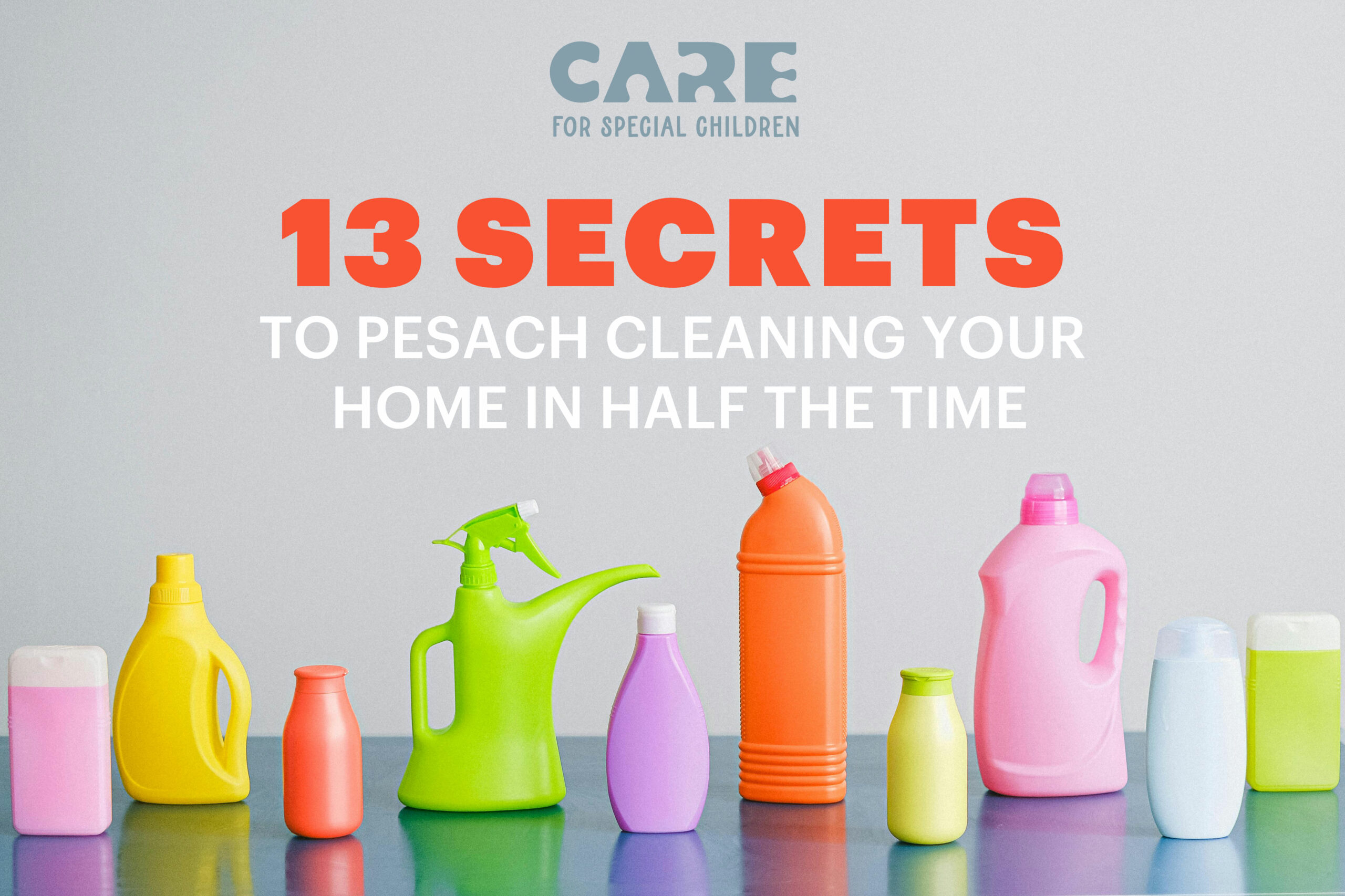April 15, 2024
Pesach Survival Guide
Victoria Safdieh Offers Expert Tips and Tricks on How to Get Through Pesach
Do you break into a sweat, just thinking about the upcoming holidays? Do you cringe at the thought of awkward moments you are sure to have, the looks or comments from family members when your child is having a tantrum because he can’t express himself? How will everyone react or respond? These are some of the thoughts and fears I have had over the years, and you may have as well.

Handling a holiday with a child that has special needs has its own unique challenges. We know that holidays are supposed to be an exciting and meaningful time for families to reunite, celebrate, and practice both religious rituals and family traditions, but sometimes holiday gatherings aren’t magical. Sometimes they’re more stressful for us than the average family. The hubbub of family celebrations and parties can overwhelm those with sensory issues. The vacation from school and work, means a break from routine, something that kids with special needs and their parents depend on, and your child may find it a bit unsettling. Many families travel, facing traffic and long airplane rides. How can anxious, easily frustrated or fragile children hope to survive all that?
Here are some tips that I hope will help ease the stress and make your holidays and family time less stressful and more enjoyable for all!
Plan ahead! Plan ahead! Plan ahead!
When it comes to having a child with special needs extra considerations often arise. Not only will you have to prepare the usual things, like food, clothes, and everything else your family needs, plus you must plan for your special child and his needs— what to take, who will be there, when to arrive, when to leave, where and how they will sleep, will you need a wheel chair or medical equipment? First if your child is verbal, have a conversation with him/ her (from here on we’re going to say him). Discuss how you expect him to behave and don’t shy away from specifics. Let him know the rules, what he should expect, and what is expected of him. You will have to keep reminding him over the holiday, so it stays fresh in his mind each day. Talk to your hosts as well. It is sometimes necessary to prepare your relatives, so they have realistic expectations.
As a parent, you never want to put your child in a situation where he will fail. If there’s a family member who insists on kisses from the children, let her know—in no uncertain terms—not to include your child in that ritual. If your child is nonverbal and doesn’t understand that if he breaks his cousins Lego tower, his cousin will get upset, you may want to speak to his cousin, and the other children, before they interact, and explain that your child doesn’t understand what he is doing.

Ask
This might or might not work. Getting along with cousins and other kids they don’t see often can be a challenge. Just because kids are approximately the same age doesn’t mean they will be natural friends, but they should still try to get along (with adult support if needed). If your child gets frustrated easily, when he doesn’t get his way, encourage him to share and be polite with his cousins. Rule of thumb, let kids try to settle their own arguments. Parents shouldn’t get involved, until it’s absolutely necessary. When it comes to a child with special needs, he can also try to work things out, but if conflict arises, they can’t settle things amicably, and he needs your support, let him know that he should find you. Family gatherings can be teachable moments. Just because you’re family doesn’t mean that everyone gets along well with everyone else. Let kids know that family is important and sometimes you must deal with people you don’t really like, but you should try to get along. As parents, you are probably doing the same with some relatives, this is a good time to model positive social behavior. If it can’t be avoided, distance your child and yourself from people who cause conflict, to keep the peace. As far as “well meaning” friends or family members who have “the answer” or advice, whether you asked for it or not, smile and say, “thank you.” Try to let the insensitive comments roll off your back (at least in front of everyone). You don’t have to agree or disagree, and you don’t have to do what they say, but you can have grace and gratitude. I must admit it is not going to be easy. My tongue has many scars from the bite marks it has had to endure over the years, but it needs to be done to get through the holiday peacefully.
If possible, bring a caregiver or baby-sitter, so he can be watched at all time.
I know this doesn’t always fit into everyone’s situation, but if it is possible, do it. You’ll be happy you did. You will be a lot calmer and you may even be able to sit, eat, and enjoy a conversation with the other adults.
Try to keep to a routine as much as possible
We love the holidays because they give us a break from our everyday routines, but that can also make them more stressful— especially for kids who find routine comforting. Try to keep some things constant, like meals or bedtime, even if the actual time is different, at least keep to the routine of bedtime. Your child will miss the structured day and activities he has in school, so keep him occupied. If you are traveling, pack a bag with multiple activities that he enjoys, a tablet is great because you can do so many things with it—watch a favorite show, play a game, listen to music, etc. If he is capable, let him help out, set the table, push the wagon in the supermarket, or even make a gift for your host. Helping will not only keep him busy, it can be meaningful to him at the same time.
If possible, plan ahead for quiet time, to decrease the over-stimulation, which could lead to a meltdown. If possible, arrange for another room that he can use when he needs a break to either chill out or take a nap. Remember, he’s just a kid; some holiday traditions depend on kids being on their best behavior. Try to keep lengthy meals and family gatherings to a minimum and customize festivities to your child’s frustration level. Managing your own expectations of what the holidays “should” be like is the most essential step. As parents, we should check in with ourselves about our expectations, and we should not extend them to our kids. It would be great if the kids could sit at the table and eat a nice holiday meal with us, but that isn’t reality. They are incapable of doing this and can’t sit still or stay quiet for a long time. It is important to appreciate that kids might find fun in other things, like helping out or playing with their cousins or running around outside, and that is ok.
Identify one or two things you would like your kids to get out of the holiday—an idea, a value, a memory of doing something special as a family—and work on achieving that. Above all else, give yourself a break, you can’t make everyone happy, and the perfect holiday is nonexistent! It’s something you only see in movies.
Unlocking Wisdom: Valuable Tips from Victoria Safdieh, founder of CARE and mom to children with special needs

CARE Goes Above and Beyond
Words cannot express how grateful I am for CARE. Their unwavering support and compassionate care has been a lifeline for our family. Knowing we have a dedicated team of professionals who truly care about my child's well-being brings me immense peace of mind. Thank you, CARE, for being a beacon of hope and a source of strength for our family.



0
comments